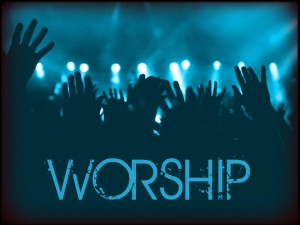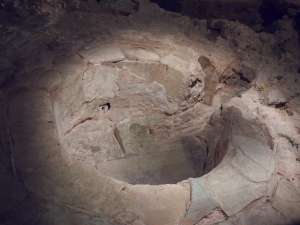Worship
Office Hours: Bob Godfrey On Public Worship And Sanctification
When we think about sanctification, that gracious, gradual renewal of believers by through faith, which results in our gradual conformity to the image of Christ, we may first think of private prayer and worship. Those are important and even indispensable to Christian . . . Continue reading →
On The Absence Of Musical Instruments From The Synagogue
Ancient Jewish cultic music was valid only in connection with the cult, and the cult was valid only at the Temple in Jerusalem. When Jerusalem fell to the Romans in 70 CE, and the Temple destroyed, the cult ceased, and with it . . . Continue reading →
Calvin On Instruments In The New Covenant: Restoring Shadows
It is evident that the Psalmist here expresses the vehement and ardent affection which the faithful ought to have in praising God, when he enjoins musical instruments to be employed for this purpose. He would have nothing omitted by believers which tends . . . Continue reading →
Heidelcast 41: Reformation Worship Conference
David Hall and the good folks at Midway Presbyterian Church (PCA) in Powder Springs, GA are hosting the fifth annual Reformation Worship Conference next month (Oct 17-20, 2013). David joined me by phone this afternoon to talk about the conference and about . . . Continue reading →
Does The Bible Command It?
In other words, when we are considering the content and conduct of our worship, the biggest question is not “Does the Bible forbid it?” but “Does the Bible command it?” That makes things much simpler because any list of what God forbids . . . Continue reading →
In Case You’ve Never Heard
One of the reasons why people resist the call to return to historic Reformed (and catholic) worship practices, e.g., singing God’s Word without musical instruments is because it is completely unfamiliar and thus seems implausible or entirely theoretical. It isn’t. Thanks to . . . Continue reading →
Calvin: Instruments In Public Worship Is The Restoration of Shadows
For even now, if believers choose to cheer themselves with musical instruments, they should, I think, make it their object not to dissever their cheerfulness from the praises of God. But when they frequent their sacred assemblies, musical instruments in celebrating the . . . Continue reading →
Reformed Churches Of Nassau (1578): No Organs In Church
Latin songs, as well as organs (first introduced into the churches by Pope Vitellianus about 665) are for the most part abolished in the churches of this land. Not that the use of the Latin language or of music is rejected of . . . Continue reading →
On Elements and Circumstances
An HB Classic
The Reformed confessions distinguish between the elements of worship and the circumstances of worship. In Westminster Confession 21 we say, “…the acceptable way of worshiping the true God is instituted by himself, and so limited by his own revealed will, that he . . . Continue reading →
Could Instruments Be Idols?
Friday, in the Medieval-Reformation course I gave a lecture on Calvin’s doctrine of worship during which a student asked about instruments. I replied that Calvin (and most of the Reformed) would have viewed the introduction of instruments into the service the same . . . Continue reading →
Of Musical Instruments, Worship, Choirs, Levites, And Blood
The use of instruments in worship was admittedly part of the Temple service. It had no place in the Tabernacle before David’s day, beyond the use of two silver trumpets made by Moses, in the hands of the priests. There is not . . . Continue reading →
Heidelcast 12: Worship, Baptism, And Romanism
On Worship, Baptism, and Romanism
David writes with a question on worship, which we may paraphrase thus: If we can do something in worship on a Wednesday night Bible study or in personal devotions why can’t we do it in a Sunday morning service? Ken asks whether . . . Continue reading →
Calvin On Instruments: "Stupid Imitation"
The musical instruments he mentions pertained to the time of instruction.1 Nor should we stupidly imitate a practice which was proper only for God’s old [covenant] people…. They were for use under the legal cult.2 John Calvin, From his commentary on Ps . . . Continue reading →
What To Do With the Joy That Wells Up Within?
Responding to the Gospel with God's Word
Aimee Byrd at Housewife Theologian asks a great question about what to do with ourselves after a baptism. How do you celebrate this moment? Let me ask you readers, do you clap in your church after a baptism? Our church congregation doesn’t. . . . Continue reading →
Psalms, Hymns, And Spiritual Songs In The Septuagint
Thanks to Adam B. who posted on the Puritanboard a chart that stimulated this post. The chart has been modified slightly by numbering the Psalms to conform to the Septuagint (LXX). According to tradition, based on the letter of Aristeas, the Hebrew Scriptures . . . Continue reading →
Hart: It’s Not About Style
Darryl writes: “…pipe organs are no more beautiful than guitars, and upper-, middle-, and lower-class aesthetics have no standing in “traditional” Reformed worship. The reason has everything to do with theology of the Lord’s Day, when Christians assemble with all the angels . . . Continue reading →
What We Can Learn From the Free Church About Conservatism and Sola Scriptura
The Free Church of Scotland, by a narrow margin, has voted to allow the introduction of musical instruments and non-inspired songs into its public worship services. As unfortunate as that decision is, if news accounts are to be believed, the grounds for . . . Continue reading →
Office Hours: Terry Johnson on Worship
This week Office Hours talks with the Rev Terry Johnson, Senior Minister, Independent Presbyterian Church, Savannah, GA. This episode is available now on iTunes. It should be available on the website later today. We’re still taking calls at 760 480 8477. Leave . . . Continue reading →
Now in the Bookstore: Tributes to John Calvin
The latest volume in the Calvin500 series is the publication of the conference papers delivered last summer in Geneva as part of the year-long celebration (Calvinpalooza) of John Calvin’s 500th birthday. This is a wide-ranging collection of essays by a diverse, international . . . Continue reading →







